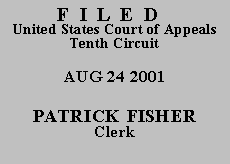Plaintiff-Appellee,
 No.
01-1127
No.
01-1127
Defendant-Appellant.
| UNITED STATES OF AMERICA,
Plaintiff-Appellee, |
|
| v. |
|
| MANUEL EDMUNDO SANCHEZ-DOMINGUEZ, also known as Manuel
Edmund Dominguez,
Defendant-Appellant. |
|
Manuel Edmundo Sanchez-Dominguez, a federal prisoner proceeding pro se, requests a certificate of appealability to appeal the denial of his 28 U.S.C. § 2255 habeas petition. We deny a certificate of appealability and dismiss the appeal.
In 1994, Sanchez-Dominguez was deported from the United States to Mexico following a drug conviction. In 1998, he was convicted of illegal reentry after deportation, in violation of 8 U.S.C. § 1326(a) and (b)(2), and was sentenced to eighty-four months' imprisonment. Sanchez-Dominguez did not file a timely notice of appeal, but on July 15, 1999, he wrote to the district court inquiring whether his attorney had filed a notice of appeal. On September 27, 1999, his attorney filed a motion to allow the filing of an untimely notice of appeal, which was denied.
Sanchez-Dominguez filed his 28 U.S.C. § 2255 petition on August 7, 2000, asserting (1) ineffective assistance of counsel for failure to object to the indictment on double jeopardy grounds, failure to move for a jury trial, failure to challenge his prior state conviction, failure to challenge his prior deportation order, failure to investigate and assert extraordinary circumstances as a basis for downward departure, and failure to appeal the denial of the request for downward departure; (2) his conviction and sentence violated the ruling in Apprendi v. New Jersey, 530 U.S. 466 (2000); and (3) his conviction and sentence did not comply with the provisions of 21 U.S.C. § 850 for charging prior convictions for defendants charged with having prior drug convictions. The district court found Sanchez-Dominguez failed to satisfy either prong of the test to review ineffective assistance of counsel claims set forth in Strickland v. Washington, 466 U.S. 668 (1984). The court further determined his claim under Apprendi lacked merit because his sentence was enhanced on the basis of a prior conviction. See 530 U.S. at 487-88. The court determined that Sanchez-Dominguez apparently intended to cite 21 U.S.C. § 851 in his final allegation, but that § 851 applied "only to charging and proving prior drug offenses for statutory penalty enhancement purposes in connection with new drug offenses." Order at 8. The court denied the petition and subsequently denied a certificate of appealability.
In his opening brief, Sanchez-Dominguez contends his "[c]ounsel's performance was deficient for failing to raise [the] issue of 'cultural assimilation'" as a ground for downward departure on appeal, and "[a]ppellant was prejudiced thereby because [the] issue was not appealed." Br. at 16.
To establish substantial denial of a constitutional right based on ineffective assistance of counsel, a defendant must show
[f]irst, . . . [that] counsel committed serious errors so as to not be functioning as the "counsel" provided by the Sixth Amendment. To determine whether counsel's performance comported with the Sixth Amendment, the inquiry is whether the attorney's conduct is reasonable in light of all the circumstances of the case. This is an objective standard based on whether the reasonable defense attorney would act in the same manner as the defense counsel in the situation being analyzed. Second, it must be shown that counsel's performance was prejudicial to the defense. The defendant must show that there is a reasonable probability that, but for counsel's unprofessional errors, the result of the proceeding would have been different.
United States v. Voigt, 877 F.2d 1465, 1467-68 (10th Cir. 1989) (citing Strickland, 466 U.S. at 687-88, 694) (internal quotations omitted). While Sanchez-Dominguez asserted several ineffective assistance arguments in the district court, his only assertion on appeal is counsel's failure to appeal the court's denial of a downward departure based on cultural assimilation. Therefore, the other ineffective assistance arguments are deemed waived.
"Our review of a sentencing court's refusal to grant a downward departure is narrow." United States v. Browning, 252 F.3d 1153, 1160 (10th Cir. 2001).
[C]ourts of appeals cannot exercise jurisdiction to review a sentencing court's refusal to depart from the sentencing guidelines except in the very rare circumstance that the district court states that it does not have any authority to depart from the sentencing guideline range for the entire class of circumstances proffered by the defendant. . . . This exception does not apply when a sentencing court concludes under the defendant's particular circumstances that it does not have the authority to depart.
Id. at 1160-61 (citing United States v. Castillo, 140 F.3d 874, 887 (10th Cir. 1998)). Here, the district court recognized that it had the authority to grant a downward departure based on cultural assimilation but elected not to do so. The court's decision not to grant the motion for downward departure was therefore not appealable. See id. Counsel's failure to engage in a frivolous appeal cannot be considered ineffective assistance of counsel.
Sanchez-Dominguez has not "made a substantial showing of the denial of a constitutional right," 28 U.S.C. § 2253(c)(2). We DENY a certificate of appealability and DISMISS the appeal. The motion to proceed in forma pauperis on appeal is DENIED. The mandate shall issue forthwith.
Entered for the Court
Mary Beck Briscoe
Circuit Judge
*.This order and judgment is not binding precedent, except under the doctrines of law of the case, res judicata, and collateral estoppel. The court generally disfavors the citation of orders and judgments; nevertheless, an order and judgment may be cited under the terms and conditions of 10th Cir. R. 36.3.